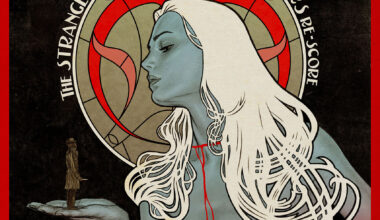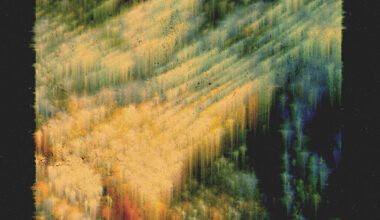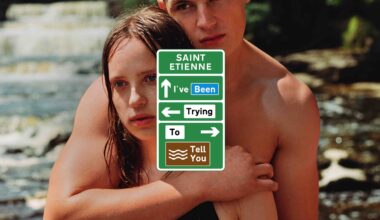It is 40 years since the release of this era-defining collection, which served as an irresistibly alluring introductory sampler for the then newly formed label and its ambitious cosmopolitan/internationalist aesthetic.

Les Disques du Crépuscule was founded in Brussels in 1980 by journalists Michel Duval and Annik Honoré, together with designer Benoît Hennebert, key figures in Brussels’ burgeoning underground scene and closely involved with booking bands for the city’s legendary Plan K arts venue. Many of those acts were on the Factory label, due to Honoré’s close relationship with Joy Division, and frontman Ian Curtis in particular. By the turn of 1980, the trio had an agreement with Tony Wilson to set up his European sub-label, Factory Benelux, and the entirely separate Les Disques du Crépuscule soon followed. Its offices were located with supernatural serendipity on Rue du Manchester.
Very much in tune with the rapidly developing British, American and European new wave and with a ready-made network of influential industry contacts at hand, in no time at all the label had gathered an impressive roster, and had to find an appropriate vehicle to present it, as it were, from Brussels with love.
Billed as a “deluxe” tape package, ‘From Brussels With Love’ offered exclusive tracks from their carefully curated corps of emerging post-punk, new wave electronic and avant-garde talent. Acts like John Foxx, Thomas Dolby and Der Plan, “spare” non-UK recordings from the Factory Records roster – by Durutti Column, A Certain Ratio and a nascent, as yet unnamed New Order among others – alongside experimental pieces from the likes of Michael Nyman and Harold Budd. With additional spoken word interludes from iconic French actress Jeanne Moreau, who speaks in her native tongue with no sleevenote translation provided (how that must’ve delighted all those tortured suburban sixth form intellectuals), as well as Brian Eno, who muses on dilettantism among other esoteric subjects.
This exceptional treasure trove – the majority of which, incredibly, remains exclusive to this day – announced the birth of mainland Europe’s first boutique, salon-inspired label; releasing music, energised by its big British Factory cousin, for art’s sake as well as its own.
And so what of the music? No doubt helped by the flawless remastering here, aside from the odd track it all sounds brand new. The exquisite, fragile delicacy of Vini Reilly’s filigreed guitar work and febrile vocals on Durutti Column’s mesmerising ‘Sleep Will Come’ is an undoubted highlight. As is the astonishingly poetic instrumental meditation on memory and isolation provided by former Be Bop Deluxe genius Bill Nelson. His ‘The Shadow Garden’ is a tour de force in seductive ambient simplicity.
The Siouxsie Sioux-inspired vocals of Repetition’s stark, angular post-punk standard ‘Stranger’ perhaps provides the strongest indicator of the actual time and place – a lost, half-derelict early 80s London in this particular case. That’s followed in thrilling counterpoint by Harold Budd’s ‘Children On The Hill’ though, which is another thing entirely – his achingly melancholic piano seems to slow time itself, and is a wistful, enigmatic gem.
Slowly regrouping after Ian Curtis’ death, the three remaining members of Joy Division contributed unbilled. They play on Kevin Hewick’s ‘Haystack’, Factory’s folk-influenced singer-songwriter whose plaintiff vocals are as affecting as the lyrical content is unsettling: “She picked up her stilettos and we fell into the haystack / And I found a needle and she pulled her sleeve back” he cries, while Peter Hook’s Stygian bassline adds further darkness. A transitionary sidenote yes, but so redolent with a poignancy that’s perhaps not unrelated to Curtis’ tragic absence.
The package itself is meticulously and lovingly curated, and includes some delightful artefacts reproduced inside the accompanying 45-page hardback book. Alongside priceless archive images of the singers, players and indie svengalis are promotional flyers, posters, covers and gig tickets (200 francs in May 1981 to see New Order play Brussels…), many produced by brilliant label creatives Benoît Hennebert, Claude Stassart and Jean-François Octave.
Also included are some thrillingly insightful notes and letters from contributors and associates, such as a note from Postcard’s Alan Horne in December 1980 to Annik Honoré in which he enthuses about his newly signed band, Aztec Camera, who are “led by a 16-year-old, who has about 10 brilliant songs the equal of the Orange Juice singles”.
It’s all such wonderful stuff, and further reinforces the significance of this exceptional sampler, which announced the label’s ambition and lofty intellectual ideals in fully formed fashion. Following a mere four years after punk’s righteous DIY iconoclasm, this truly was an era-defining turning point, which remains to this day one of independent music’s most visionary collective efforts.





